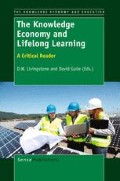Abstract
In this chapter, I argue that a critical understanding of the notion of a knowledgebased economy (KBE) in advanced capitalism requires attention to the ways that the details of everyday occupational life and learning represent an important arena of political economic struggle. As elsewhere in this volume, the discussion below relates to questions defining the nature of a KBE. For example, I respond to the very real impacts of the increasing speed of innovation and change in work processes which often, as is the case in the research below, is mediated by new forms of production technology and work design.
Access this chapter
Tax calculation will be finalised at checkout
Purchases are for personal use only
Preview
Unable to display preview. Download preview PDF.
References
Avis J. Engestrom's version of activity theory: A conservative praxis? Journal of Education and Work. 2007;20(3):161–177.
Blau P. The dynamics of bureaucracy: A study of interpersonal relationships in two government agencies. London: University of Chicago Press; 1955.
Bowker GC, Star SL. Sorting things out: Classification and its consequences. Cambridge, MA: MIT Press; 1999.
Burawoy M. Manufacturing consent: Changes in the labour process under monopoly capitalism. Chicago: University of Chicago Press; 1979.
Daniels H, Leadbetter J, Warmington P, Edwards A, Martin D, Popova A, Apostolov A, Middleton D, Brown S. Learning in and for multi-agency working. Oxford Review of Education. 2007;33(4):521–538.
Engestrom Y. Learning by expanding: An activity-theoretical approach to development research. Helsinki: Orienta-Konsultit; 1987.
Engestrom Y, Miettinen R, Punamaki R-L. Perspectives on activity theory. New York: Cambridge University Press; 1999.
Engestrom Y, Sannino A. Studies of Expansive Learning: Foundations, findings and future challenges. Educational Research Review. 2010;5:1–24.
Felstead A, Fuller A, Jewson N, Unwin L. Improving working as learning. Abingdon: Routledge; 2009.
Glisson C, Hemmelgarn A. The effects of organizational climate and interorganisational coordination on the quality and outcomes of children's service system. Child Abuse and Neglect. 1998;22(5):401–421.
Hampson I, Junor A. Putting the process back in: Rethinking service sector skill. Work, Employment and Society. 2010;24(3):526–545.
Hennessy T, Sawchuk PH. Worker responses to technological change in the Canadian public sector: Issues of learning and labour process. Journal of Workplace Learning. 2003;15(7):319–325.
Ilyenkov EV. The dialectics of the abstract and the concrete in Marx's Capital. Moscow: Progress; 1982.
Kaptelinin V. The object of activity: Making sense of the sense-maker. Mind, Culture and Activity. 2005;12(1):4–18.
Knorr Cetina K. Epistemic cultures: How the sciences make knowledge. Cambridge: Harvard University Press; 1999.
Langemeyer I, Roth W-M. Is cultural-historical activity theory threatened to fall short of its own principles and possibilities as a dialectical social science? Critical Social Studies - Outlines. 2006;8(2):20–42.
Leontiev AN. Activity, consciousness, and personality. Englewood Cliffs, NJ: Prentice Hall; 1978.
Marx, K. (1990). Capital (Vol. 1). New York: International.
Niewolny K, Wilson A. What happened to the promise? A critical (re)orientation of two sociocultural learning traditions. Adult Education Quarterly. 2009;60(1):26–45.
Sawchuk PH. 'Use-value' and the re-thinking of skills, learning and the labour process. Journal of Industrial Relations. 2006a;48(5):593–617.
Sawchuk PH. Activity and power: Everyday life and development of working-class groups. In: Sawchuk PH, Duarte N, Elhammoumi M, editors. Critical perspectives on activity: Explorations across education, work and everyday life. New York: Cambridge University Press; 2006b. p. 238–267.
Sawchuk PH. Understanding diverse outcomes for working-class learning: Conceptualizing class consciousness as knowledge activity. Economic and Labour Relations Review. 2007;17(2):199–216.
Sawchuk PH. Re-visiting Taylorism: Conceptual implications for studies of lifelong learning, technology and work in the Canadian public sector. In: Livingstone DW, editor. Lifelong learning in paid and unpaid work. New York: Routledge; 2010a. p. 101–118.
Sawchuk PH. Occupational transitions within workplaces undergoing change: A case from the public sector. In: Sawchuk P, Taylor A, editors. Challenging transitions in learning and work: Perspectives on policy and practice. Rotterdam: Sense; 2010b. p. 189–208.
Sawchuk, P.H. (Forthcoming). Working knowledge and the limits of control: Social services, technology and the pathways of occupational expertise.
Sawchuk PH, Stetsenko A. Sociological understandings of conduct for a non-canonical activity theory: Exploring intersections and complementarities. Mind, Culture and Activity. 2008;15(4):339–360.
Thompson P. The nature of work: An introduction to debates on the labour process. London: Palgrave; 1997.
Vygotsky, L.S. (1994). The problem of the environment. In Vander Veer, R. & Vlasiner, J. (Eds.), The Vygotsky reader (pp. 338-354). Cambridge, MA: Blackwell.
Warhurst C, Thompson P. Mapping knowledge in work: Proxies or practices? Work. Employment and Society. 2006;20(4):787–800.
Warmington P. From 'activity' to 'labour': Commodification, labour power and contradiction in Engeström's activity theory. Critical Social Studies - Outlines. 2008;10(2):4–19.
Editor information
Editors and Affiliations
Rights and permissions
Copyright information
© 2012 Sense Publishers
About this chapter
Cite this chapter
Sawchuk, P.H. (2012). Divergent Working and Learning Trajectories in Social Services. In: Livingstone, D.W., Guile, D. (eds) The Knowledge Economy and Lifelong Learning. The Knowledge Economy and Education, vol 4. SensePublishers, Rotterdam. https://doi.org/10.1007/978-94-6091-915-2_14
Download citation
DOI: https://doi.org/10.1007/978-94-6091-915-2_14
Publisher Name: SensePublishers, Rotterdam
Online ISBN: 978-94-6091-915-2
eBook Packages: Humanities, Social Sciences and LawEducation (R0)

